
ACT Science Tips
The ACT Science section is the 4th section of the ACT. This section focuses on testing skills such as data interpretation, the ability to draw conclusions, and a general understanding of the scientific process. With a short timeframe and an often punishing curve, the ACT science can be a tricky test to master, but guided practice and an understanding of the structure of the test can allow anyone to achieve their desired score in this section.

This blog was originally published on April 12, 2023. It has been updated with the most recent information.
What is the ACT Science test?
The optional ACT Science section is the 4th section of the ACT. This section focuses on testing skills such as data interpretation, the ability to draw conclusions, and a general understanding of the scientific process. With a short timeframe and an often punishing curve, the ACT science can be a tricky test to master, but guided practice and an understanding of the structure of the test can allow anyone to achieve their desired score in this section.
Should I take the ACT Science test?
Understand that the science section store does not count towards your composite score. The section is fully optional and you make the decision whether to take it or not when you register for the ACT. It costs $4 extra on top of the registration fee to add this section to your exam. Certain colleges may request the science score, especially for STEM and relevant programs. Check with the list of universities you’re applying for when making this decision.
ACT Science Passages
The ACT Science section includes 6-7 passages (depending on the test). These can cover biology, chemistry, physics, earth science, and environmental science.
ACT Science Questions
The science section contains 5-7 questions per passage. These can be split into 3 types: questions which can be directly answered from the passage, questions that require some form of interpretation of the data or conclusions, or questions that pull from outside knowledge.
ACT Science Timing
The science section has 6-7 passages with a total of 40 questions and must be done in 35 minutes. This is about 5-6 minutes per passage, or just under a minute per question.

Is ACT Science hard?
The ACT science section (in my opinion) has the easiest questions to answer in a vacuum. Most of the questions have answers within the passage and there is less interpretation required to tackle the section than the reading. However, this test is not given in a vacuum. The primary difficulties come from a relatively harsher curve than the reading section, time pressure, and attention dropping near the end of the test. With only 5-6 minutes per passage, a lot to read, and places to make errors due to inattention, the section demands diligence and careful practice.
ACT Science Score
How is the ACT Science section scored?
The science section is scored out of 36, as are all the other sections. Depending on the test, the curve could look very different; a 35/40 on the questions could be anywhere between a 28 and a 33 as the final score.
What is a good ACT Science score?
The median ACT Science score is a 20, so scores higher than that can be considered good. That said, each college has its own standards, and the median scores per college are posted online. Be sure to look at the colleges you're interested in applying to for more accurate measures of the scores you should be aiming for.
What do you need to study for ACT Science?
To perform well on the ACT science, you should be able to read plots and passages and accurately interpret them. Make sure to understand how various types of plots can be read (scatter plots, line graphs, etc) and be comfortable reading scientific passages and drawing conclusions from them.
A small number of questions from the test require outside knowledge. Consider reading basic biology, chemistry, physics, and earth science. These questions tend to be rudimentary (such as asking whether north and south attract each other).
The primary focus of this test is on quickly interpreting the passage in order to answer questions. Focus your study on practice with real passages. Ivy Tutors can help to personalize a study plan for you.

Tips for mastering the Science part of the ACT
1. Know the content
To succeed on this test, it's crucial to know both the structure and the possible content on the test. The test includes biology, chemistry, physics, earth science, and environmental science. While the test usually gives enough information for the questions within the passages, being familiar enough with the relevant topics to quickly understand a passage will improve your performance.
2. Don't read the entire passage on the first read
The ACT science section simply does not provide enough time for a full read of each passage. Instead, preview each passage in a 45-90 second skim. Focus on understanding the italicized words and the axes of each graph. These will be enough to get a gist of the passage while leaving enough time to answer the questions.
3. Understand the graphs
With that last tip in mind, it's extremely useful to understand the graphs and figures in each section. Look for trends for variables changing together and see if you can draw any conclusions from them. It's important not to spend too much time on this - if you can quickly and succinctly sum up the trends in the data, it'll help significantly, but if you can't, you still have a chance to get the questions right. Don't spend too much time trying to follow this tip.
4. Practice without time
At this point, it's worth making sure that your accuracy on the test is as strong as possible, and practicing some tests without time to make sure you understand how to get all the questions right without the constraints of time. After practicing without time, be sure to add it back in using the next tips to keep that accuracy up in the limited time format.
5. Read the entire question
The question often references graphs and figures from the passage - if they do, those graphs and figures almost always contain the answer directly. Likewise, if they reference a specific experiment, the answer is usually there. Use the question to guide where you look, and make sure you don't miss anything specific on the question - many questions can have their meaning modified by even a single word, and reading the question is the easiest place to allow an easy mistake.
6. Go back to the passage at most once per question
When answering the questions, it's important to be deliberate in your decision making process. At each question, ask yourself what information you need to answer the question and where you might find that in the passage. Do your best to remember what you're looking for as you go to the question - time can easily be lost by going back and forth from the passage repeatedly. For each question, go back one time, find what you're looking for, answer the question, and move on.
7. Leave extra time for the conflicting viewpoints passage
On each test, there is a passage that asks you to analyze multiple explanations for a single phenomenon. This section will almost always take longer than the rest of the test - it often doesn't have graphs and figures, meaning that the approach will need to be slightly different. Focus on finding the differences between the viewpoints (usually found in the first sentence of each scientist's viewpoint) and using that to answer questions. Because this process is a little different, I'd recommend estimating another 30 seconds on this passage (and decreasing the time on other passages accordingly).
8. Don't double check questions or go backwards
The test doesn't give enough time to plan to check back over questions. Instead, plan on doing the questions deliberately and to be confident in your answer the first time. Planning on doubling back will slow you down and allow for doubt, both of which will reduce your likelihood for success. This is unlike the other sections of the test like math, where skipping questions can be useful - in this case, doing things out of order takes too much time, and that is limited on this section in a way that it's not in others.
9. Study up on basic science knowledge
There are rare questions which cover the basics of biology, chemistry, and physics and which are not covered in the passage. These are less of a priority than the other questions, but if you're having trouble on these in particular, consider reviewing basic concepts of each field in physics. These are usually basic questions, on the level of how gravity and magnetism work, but if they are a trouble spot this is a place to review.
10. Keep momentum from the rest of the test
The science section is at the end of the ACT, which means that you'll be reaching it after 3 hours of intense work. To maximize your chances of nailing the science section, it's very important to work on stamina and pacing up until this point so that you're in the correct state of mind to optimize your test taking abilities. Ivy Tutoring can help make a comprehensive plan to tackle the test as a whole.
11. Keep it simple
The science test very rarely, if ever, contains trick questions - the majority of questions are very straightforward. It's easy to overthink, and slowing down and recognizing that the questions tend to just require interpreting the graphs can save a lot of time and energy (both of which are key resources on this test).
If you’re struggling to crack the code code on the ACT Science section, Ivy Tutors Network can help! Our expert ACT tutors know all the tips and tricks for excelling high on the exam. With a little personalized attention, you’ll be well on your way to reaching your target score – or higher!




